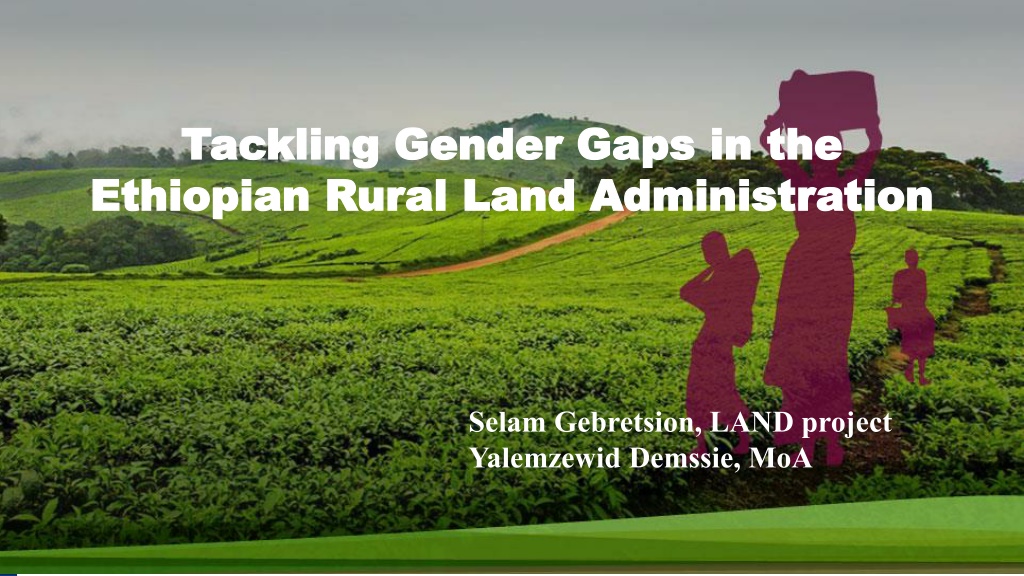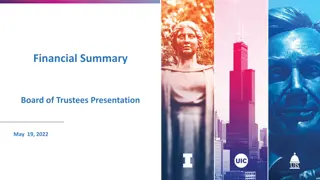
Empowering Women in Ethiopian Rural Land Administration
Learn about the Ministry of Agriculture's efforts to address gender gaps in rural land administration in Ethiopia. Discover the legal framework and challenges surrounding women's land rights, as well as ongoing amendments to the Ethiopian Rural Land Proclamation to ensure inclusivity and equity. Explore how customs and norms influence women's access to land and the recommendations for enhancing gender equality in land ownership.
Download Presentation

Please find below an Image/Link to download the presentation.
The content on the website is provided AS IS for your information and personal use only. It may not be sold, licensed, or shared on other websites without obtaining consent from the author. If you encounter any issues during the download, it is possible that the publisher has removed the file from their server.
You are allowed to download the files provided on this website for personal or commercial use, subject to the condition that they are used lawfully. All files are the property of their respective owners.
The content on the website is provided AS IS for your information and personal use only. It may not be sold, licensed, or shared on other websites without obtaining consent from the author.
E N D
Presentation Transcript
Ministry of Agriculture Tackling Gender Gaps in the Tackling Gender Gaps in the Ethiopian Rural Land Administration Ethiopian Rural Land Administration Selam Gebretsion, LAND project Yalemzewid Demssie, MoA
Background Ministry of Agriculture In recognition of the importance of women s land rights (WLRs) to inclusive development, WLRs are included in: United Nations Sustainable Development Goals (SDG) African Union Declaration on Land Issues and Challenges in Africa AU Resolution calling on Member States to realise the 30 percent target for women s documented land rights
Background Ministry of Agriculture At the national level, the Government of Ethiopia has made commitments and taken significant steps. For example: Convention on the Elimination of All Forms of Discrimination against Women ( CEDAW) Protocol to the African Charter on Human and Peoples Rights of Women in Africa
Womens Land Rights in Ethiopia Ministry of Agriculture Legal Framework Right to ownership of land is vested in the state. Hence, it is impossible to transfer the land holding to others in sale or in exchange for another property. In line with the Constitution, federal and regional rural land laws include provisions that explicitly grant women equal rights to acquire, inherit, administer and transfer land. Federal Constitution mandates joint ownership of land by husbands and wives
Womens Land Rights in Ethiopia Ministry of Agriculture Women s rights to land are influenced by customs and norms. Men possess greater and better land rights to land because prevailing inheritance and marital norms/practices favor men and sons. E.g. In some communities, sons marry and remain on the farm and usually inherit land under custom (patrilineal system).
Ethiopian Rural Land Law Ministry of Agriculture Ethiopian Rural Land Proclamation is currently being amended. A gender review of the Rural Land Proclamation concluded that while the Proclamation included some positive provisions, it systematically incorporate the concerns of women, the elderly, orphans and other marginalized groups The assessment recommended a revision and provided good practices/set of options for addressing identified gaps and inconsistencies Currently, there are no local women s group outside of the state system that work on policy issues related to women rights to land. did not adequately and
Mechanisms for Addressing WLRs Ministry of Agriculture The responsible for ensuring the right of women in all aspects of the State s intervention sits in the Ethiopian Ministry of Women and Children s Affairs. It also has representatives in each sector, region, zone and at woreda levels. However, the institution has limited financial, technical and human resource capacity to engage in all sectors as needed. leading government institution
Women Land Rights Task Force (WLRTF) Ministry of Agriculture In accordance with the recommendations of the gender assessment, the Ministry of Agriculture and Natural Resource, in collaboration the Land Administration to Nurture Development (LAND) project, established a federal Women s Land Right Task Force (WLRTF) in February 2015. WLRTF is composed of governmental and non- governmental institutions (land projects)
Ministry of Agriculture Members include; Ministry of Agriculture and Natural Resource (Chair) Ministry of Women s, Children and Youth Affairs; (Vice-Chair) Ministry of Justice; Ministry of Federal Affairs; Ministry of Labor and Social Affairs; Federal Supreme Court; Land Administration to Nurture Development (LAND) Project, USAID/Pastoralists Areas Resilience Improvement through Market Expansion PRIME Project, DFID/Land Investment for Transformation (LIFT) Programme UNWOMEN (new member)
WLRTF: Objective Ministry of Agriculture To consult women and deliberate on women s land rights issues in order to inform formulation implementation responsive land policy and legislation in Ethiopia and of gender
WLRTF: Roles and Responsibilities Ministry of Agriculture 1. Participate in the drafting process a) Review and comment on legislations b) Draft policy briefs on women s land rights issues c) Lobby on women s land rights issues to influence the drafting process Organize annual conference, public lectures, seminars, symposia and workshops on women s land and property rights, land tenure and administration issues Disseminate information through publications of newsletters, reports, fact sheets Enhance the capacity of stakeholders 2. 3. 4.
WLRTF: Process & Progress Ministry of Agriculture WLRTF and drafting committees received intensive training on women s land rights by land and gender experts WLRTF Identified entry points Deliberated on the administration law Provided on-going technical assistance to the drafting committee Support the establishment of regional task forces (Tigray, Amhara, Oromia and SNNPR) draft rural land
WLRTF: Accomplishments Ministry of Agriculture Advocated for gender sensitive and responsive provisions amendment of Proclamation 456/2005 Raised awareness networks and at different platforms Worked with researchers to encourage more research on gender and land issues Compiled laws and research papers on gender issues in land administration system Developed a fact sheet in the No. Established WLRTF in four regions (Oromia, Tigray, SNNPR and Amhara) among gender Identified respective regional laws gender gaps in their universities and
Challenges Ministry of Agriculture Limited awareness and commitment to address gender issues among key stakeholders High turnover experts/specialists Lack of financial competing obligations of task force members limited (particularly in regions) of national resources, commitment.
Positive Take Aways Ministry of Agriculture Coordination: Diverse group of institutions/projects collaborated and contributed positively. Platforms: Took advantage of existing platforms Awareness Raising Sustainability: WLRTF is lead and owned by the Government and not dependent on projects/programs
Conclusion & Recommendation Ministry of Agriculture Securing the land rights of women and vulnerable groups requires the effort of various institutions that work at different levels.






















